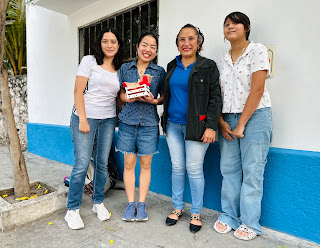Another important and necessary element during our time in Merida are Spanish classes, because the language is key for interacting with, and diving into, the culture. During this class, students not only learn grammar and structure, but also develop their linguistic abilities using colloquial forms of speech.
Culture classes are also extremely important during this stage of the program. Our students already know a little of the history of the Yucatan Peninsula from the era of ancient Mayas until today, and continuing to explore this subject helps them understand why we have certain cultural aspects today, and even how Yucatecan families function within the city compared to in a small town.
The Spanish and culture classes are perfect complements to each other, as the skills acquired in the language class are applied while writing, speaking and interacting in various rural and urban contexts as part of assignments for the culture class.
But not everything is about studying and classroom learning while being immersed in a new culture, it’s also important to have a little fun! We took a brief pause, as we do every year, for our Christmas Festival. Thanks to the enthusiasm and creativity of our students and host families who showed their talents through singing, dancing and acting, this year's festival was a great success!

The preparation and acquisition of knowledge for our students is important, which is why we take steps to enrich their learning by including many different perspectives within our culture. An integral part of the Yucatan Program are the additional lectures and workshops that help the students comprehend certain cultural aspects that they will observe and experience in the city as well as in pueblos.
Within the linguistic landscape of Merida, it is common to hear many words or regionalisms in Mayan, which is why it is important that the students have some familiarity with the Mayan language. We invited Ismael May May, an educator with a masters in social anthropology to present his lecture “Yutsil t’aan” and workshop “In k’aj óoltikech”. This experience was fundamental for our students to learn certain phrases and expressions in Yucatec Mayan that will help them in the next stage of their program in the community of Yaxunah.
Our students also had the opportunity to hear the lecture “Thoughts on Mayan/Spanish, Regional/National, Traditional/Modern in Merida’s architecture” given by architect Rafael Lara. Here, the students were able to learn about the historical and architectural processes that the city of Merida has seen, and they are now able to identify diverse architecture styles that can be found in the city.

Another interesting talk was “The Yucatecan Kitchen” by archeologist Maria Novelo, where the students learned about the difference between traditional Yucatecan food and Maya-Yucatecan food, as well as what was consumed and cooking techniques that were used in prehispanic times according to archeological evidence. This talk was hugely helpful for our students to understand a little more about how Yucatecan gastronomy has evolved.
And lastly, before our trip for three weeks to a new adventure in the community of Yaxunah and the coastal town of San Felipe, we had the lecture and workshop “Ancestral sounds: the musical instruments of Mesoamerica” led by the archeologist Pedro Hernández and anthropology professor Raúl Manzanilla, both members of the experimental musical group Kan Bacab that uses mesoamerican instruments of prehispanic origen. On this occasion, the students learned about the different types of musical instruments as well as which instruments exist today and continue to be important sounds in our contemporary cultures. At the end of the presentation, the students had the opportunity to experiment with the sounds of the musical instruments that were shown, creating a collaborative original musical piece among everyone.







.HEIC)



